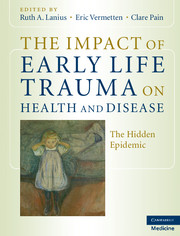Book contents
- The Impact of Early Life Trauma on Health and Disease
- The Impact of Early Life Trauma on Health and Disease
- Copyright page
- Contents
- Contributors
- Foreword
- Acknowledgements
- Section 1 Early life trauma: impact on health and disease
- Section 2 Biological approaches to early life trauma
- Chapter 9 Juvenile stress as an animal model of childhood trauma
- Chapter 10 Lateral asymmetries in infants’ regulatory and communicative gestures
- Chapter 11 Neurobiology of childhood trauma and adversity
- Chapter 12 Theneurobiology of child neglect
- Chapter 13 Early life stress as a risk factor for disease in adulthood
- Part 3 Synopsis
- Chapter 14 Early life stress and psychiatric risk/resilience: the importance of a developmental neurobiological model in understanding gene by environment interactions
- Chapter 15 Theneuroendocrine effects of early life trauma
- Chapter 16 Long-lasting effects of childhood abuse on neurobiology
- Chapter 17 Biological framework for traumatic dissociation related to early life trauma
- Chapter 18 Neurobiological factors underlying psychosocial moderators of childhood stress and trauma
- Part 4 Synopsis
- Section 3 Clinical perspectives: assessment and treatment of trauma spectrum disorders
- Epilogue
- Index
Chapter 14 - Early life stress and psychiatric risk/resilience: the importance of a developmental neurobiological model in understanding gene by environment interactions
from Section 2 - Biological approaches to early life trauma
Published online by Cambridge University Press: 03 May 2011
- The Impact of Early Life Trauma on Health and Disease
- The Impact of Early Life Trauma on Health and Disease
- Copyright page
- Contents
- Contributors
- Foreword
- Acknowledgements
- Section 1 Early life trauma: impact on health and disease
- Section 2 Biological approaches to early life trauma
- Chapter 9 Juvenile stress as an animal model of childhood trauma
- Chapter 10 Lateral asymmetries in infants’ regulatory and communicative gestures
- Chapter 11 Neurobiology of childhood trauma and adversity
- Chapter 12 Theneurobiology of child neglect
- Chapter 13 Early life stress as a risk factor for disease in adulthood
- Part 3 Synopsis
- Chapter 14 Early life stress and psychiatric risk/resilience: the importance of a developmental neurobiological model in understanding gene by environment interactions
- Chapter 15 Theneuroendocrine effects of early life trauma
- Chapter 16 Long-lasting effects of childhood abuse on neurobiology
- Chapter 17 Biological framework for traumatic dissociation related to early life trauma
- Chapter 18 Neurobiological factors underlying psychosocial moderators of childhood stress and trauma
- Part 4 Synopsis
- Section 3 Clinical perspectives: assessment and treatment of trauma spectrum disorders
- Epilogue
- Index
Summary
- Type
- Chapter
- Information
- The Impact of Early Life Trauma on Health and DiseaseThe Hidden Epidemic, pp. 148 - 156Publisher: Cambridge University PressPrint publication year: 2010
- 1
- Cited by

